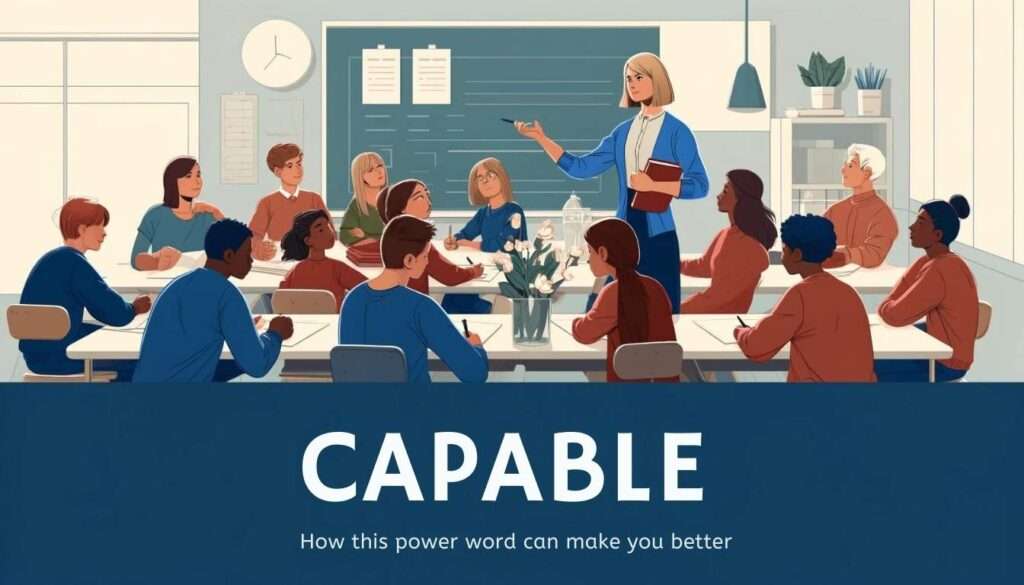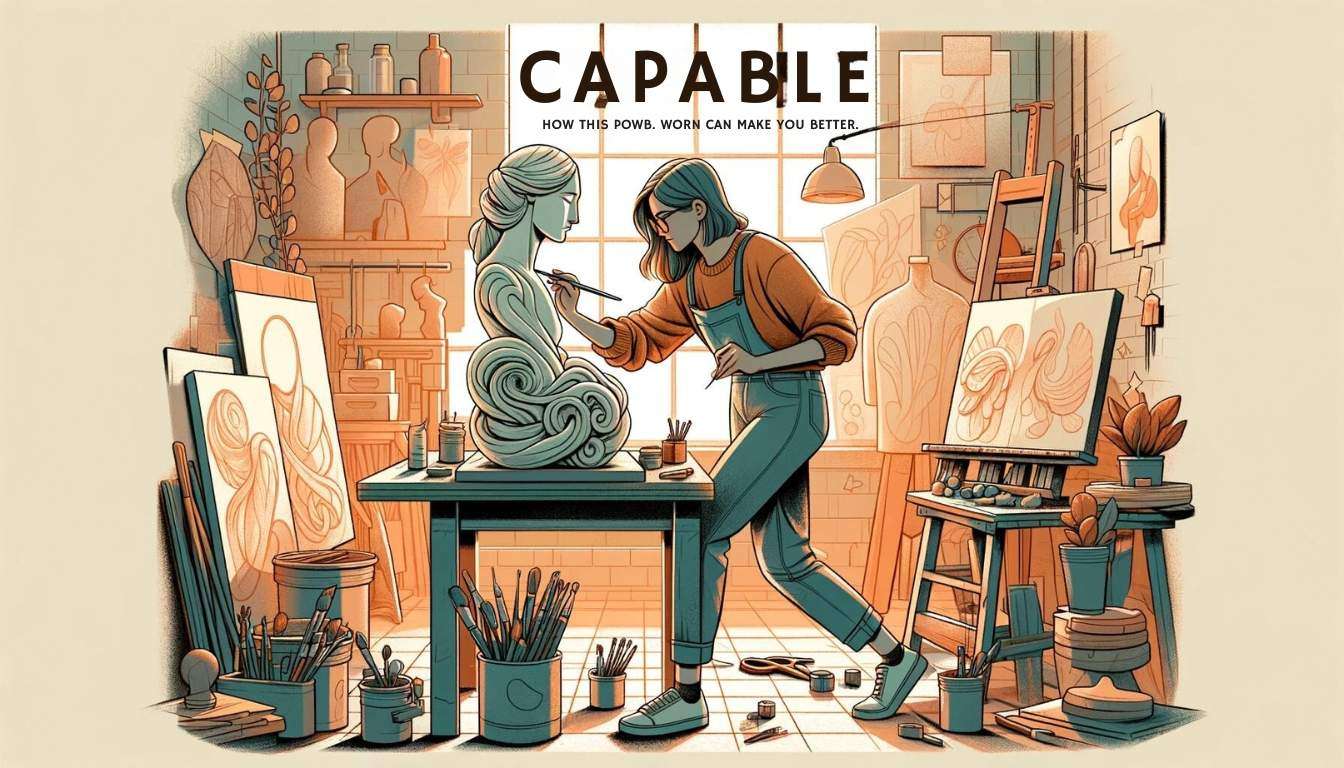Have you ever stopped to think about the word “capable?” It’s a simple word. Yet, it carries so much weight and meaning. “Capable: How This Power Word Can Make You Better” illustrates that this one word has the potential to unlock your full potential and make you better in every way. It’s a powerful word that should be a part of your vocabulary if you want to achieve great things in life.
When you start believing that you are capable of achieving your dreams, you begin to see opportunities where you once saw obstacles. You become more confident and motivated to take action towards your goals.
Being capable means having the ability to do something or being competent in a particular area. It’s a powerful word that can unlock doors of opportunity and lead you down paths to success.
The Definition of Capable
Let’s take a deeper look at the definition of “capable.” According to Merriam-Webster, capable means “having attributes (such as physical or mental power) required for performance or accomplishment.”
In other words, it means having the skills and abilities necessary to achieve your goals. Being capable doesn’t necessarily mean being perfect or knowing everything there is to know about a subject. Rather, it means having the confidence in yourself to learn and grow as you go along.
The Power and Importance of Capability
When you think about all that is possible when you’re capable, it becomes clear how important this attribute truly is. Possessing capability can help you succeed in both your personal and professional lives.
Whether it’s landing your dream job or improving your relationships with friends and family, being capable can unlock opportunities that may have been otherwise unavailable. Capability also brings a sense of empowerment and confidence in oneself.
When we feel capable, we are more likely to take risks and pursue our passions without fear of failure holding us back. Capability allows us to push past our limits and achieve things we never thought possible.
Capability is much more than just a simple word; it’s an attribute that can change lives for the better if properly harnessed. Throughout this article, we will explore this concept in depth with examples from different areas such as work, relationships, and personal growth.

The High-Level Overview of This Power Word: Capable:
Capable is a powerful word. It’s not just about being able to complete tasks or achieve goals; it’s about having the mindset and attitude to do so.
Being capable can improve your personal and professional life in countless ways. A capable person is resilient, adaptable, and confident in their abilities.
They are willing to take on challenges and learn from their mistakes. In your personal life, being capable means you are better equipped to handle the ups and downs of relationships, family, and personal growth.
Capable people can communicate effectively because they know how to listen actively, empathize with others, and express themselves clearly. They are also able to navigate difficult situations with grace because they have the emotional intelligence necessary to manage their own emotions while considering the feelings of others.
In your professional life, being capable means you are more likely to succeed in your career because you have developed the skills and knowledge needed to excel in your field.
A capable person is a valuable asset in any workplace because they are reliable problem-solvers who strive for excellence in everything they do.
Examples of successful people who embody this trait include Oprah Winfrey, Elon Musk, J.K. Rowling, and Bill Gates. These individuals achieved great success through hard work, determination, and a can-do attitude that allowed them to overcome obstacles and make significant contributions to their respective fields.
In short, being capable is a powerful trait that can help you achieve success in all areas of life, from personal relationships to professional pursuits.
So embrace this power word today by developing your skills and cultivating an attitude of resilience that will help you overcome any obstacle on your path toward greatness!
Capable in the Workplace
When it comes to showcasing your capabilities in the workplace, there are a few key strategies that can help you stand out. First and foremost, it’s important to understand your strengths and weaknesses as an employee.
You can use this information to highlight your areas of expertise and work on improving any skills that may be holding you back. In addition to understanding your capabilities, it’s also important to communicate effectively with your employer or colleagues.
This means being proactive about sharing your ideas and taking the initiative to solve problems before they become major issues. By demonstrating that you are capable of handling challenges and taking ownership of your work, you will earn the respect of those around you and set yourself up for success.
Tips for Developing New Skills and Expanding Your Capabilities
If there are specific skills or areas where you feel like you could improve, don’t be afraid to take matters into your own hands. This might involve seeking out additional training or education opportunities, volunteering for new projects at work, or even starting a side project that allows you to practice new skills.
Remember, being capable is not just about what you know now; it’s about what you are capable of learning in the future. By constantly pushing yourself outside of your comfort zone and seeking out new challenges, you can continue to grow both professionally and personally.

Capable in Relationships
When we think about being capable in relationships, whether they’re romantic or platonic, communication is often the first thing that comes to mind. And while effective communication is certainly an important aspect of any healthy relationship, there’s much more to it than just speaking clearly.
How Being Capable Can Improve Communication and Trust in Relationships
To truly build strong relationships, we need to demonstrate our capabilities in a variety of ways. This might mean showing up for a friend in need, being reliable and trustworthy, or simply being present and engaged at the moment. Of course, this is easier said than done.
Building strong relationships requires effort and vulnerability on both sides. But by consistently demonstrating our capabilities and supporting those around us as they work to develop theirs, we can create deep bonds that will stand the test of time.
Examples of How Capability Can Strengthen Friendships, Romantic Relationships, and Family Bonds
Perhaps one of the most powerful examples of how capability can strengthen relationships comes from romantic partnerships.
When both partners are capable individuals who are committed to growth and self-improvement, they can push each other to be their best selves while creating a deep sense of trust and security.
But even in non-romantic relationships like friendships or family bonds, capability can play an important role. By being there for each other during times of crisis or uncertainty—whether that means lending an ear to listen or offering practical support—we build bonds that go beyond surface-level interactions and create meaningful connections that will last for years to come.
Capable in Personal Growth
If there’s one area where being capable is truly essential, it’s personal growth. Whether you’re trying to break a bad habit, learn a new skill, or simply become more self-aware, your ability to take ownership of your life and make intentional choices will determine your success.
How to Identify Areas Where You Need Improvement
The first step towards becoming more capable of personal growth is identifying areas where you could use some improvement. This might involve taking stock of your current habits and behaviors or seeking feedback from trusted friends or mentors.
Once you’ve identified areas for growth, it’s important to set specific, measurable goals that will help you get there. The easy way to do this is by breaking down larger objectives into smaller, more manageable steps or seeking out professional guidance or mentorship to help you stay on track.
Strategies for Developing New Habits and Improving Yourself
Of course, setting goals is only the beginning; you also need to take action if you want to see real progress. This might involve developing new habits or routines that support your goals, finding an accountability partner who can provide motivation and support along the way, or simply staying committed to your vision of success.
In the end, being capable of personal growth is all about taking control of your own life and making intentional choices that will help you become the best possible version of yourself.
With dedication and persistence, anything is possible, so don’t be afraid to dream big and take bold risks as you work towards your goals.

The Science Behind Capability
There is a reason why some people seem to excel in multiple areas while others struggle to learn new skills. The answer lies in the science behind capability. Research shows that the brain can change and adapt throughout our lives.
This concept is known as neuroplasticity. It means that with proper training, our brains can form new neural pathways that enable us to learn and develop new skills.
Moreover, studies have shown that individuals who engage in deliberate practice—a specific type of practice with a high level of focus and repetition—are more likely to reach expert-level performance in their field. This indicates that capability isn’t solely based on natural talent but also on consistent effort toward improvement.
Historical Figures Who Embodied Capability
Throughout history, there have been countless examples of individuals who overcame adversity through their capabilities. These figures serve as an inspiration for us all to strive towards our goals, no matter the obstacles we face.
One such example is Helen Keller, who was both blind and deaf from an early age but went on to become an author and political activist. Despite her physical limitations, she proved that anything can be achieved with determination and hard work.
Another figure worth mentioning is J.K. Rowling, who was once a struggling single mother before achieving worldwide success with the Harry Potter series. Her story serves as a reminder that success isn’t always immediate or easy but can still be achieved through perseverance and belief in oneself.
Capability in Pop Culture
The power of capability can also be observed in popular culture through various movies, TV shows, books, or music.
A great example of this is the Rocky movie franchise, which follows Rocky Balboa’s journey from an unknown boxer to a heavyweight champion. The movies highlight the importance of hard work, perseverance, and self-belief in achieving one’s goals.
Another notable example is the song “Eye of the Tiger” by Survivor, which became an anthem for overcoming challenges and reaching new heights. Its message resonates with millions of people who strive to be capable and achieve their goals.
Conclusion: The Importance of Being Capable in All Aspects of Life
Being capable is an essential trait for success and overall well-being. From the workplace to personal growth to relationships, being capable can lead to greater opportunities and deeper connections with others.
It’s not just about mastering skills or talents; it’s about having a mindset of adaptability, resilience, and continuous improvement.
In the workplace, being capable means constantly developing new skills and taking on challenges that may be outside your comfort zone.
It also means being proactive in showcasing your capabilities to your employer or colleagues through projects or initiatives that demonstrate your value to the team. In turn, this can lead to greater job satisfaction and career advancement.
In relationships, being capable means actively working on communication skills and building trust with others.
It also means recognizing your limitations and taking responsibility for any mistakes or shortcomings. By embodying capability in relationships, you can create deeper connections with others that are based on mutual respect and understanding.
In personal growth, being capable means identifying areas where you need improvement and setting goals for yourself. This requires self-reflection and a willingness to confront challenges head-on rather than avoid them out of fear or discomfort.
By developing new habits and pushing yourself outside of your comfort zone, you can become a better version of yourself over time. Overall, the importance of being capable cannot be overstated.
While it may not always be easy or comfortable to take on new challenges or confront our limitations, it is ultimately necessary for growth and success. So let’s embrace our inner capabilities and strive toward excellence in all aspects of our lives!
FAQ
Q: What does it mean to embrace your capabilities?
Embracing your capabilities means recognizing and accepting your strengths and talents. It involves acknowledging your potential for growth and improvement and actively developing those areas to become a better version of yourself.
Q: How can self-belief empower me?
Self-belief empowers you by giving you the confidence and strength to tap into your abilities. When you believe in yourself and your potential, you are more likely to take risks, pursue goals, and overcome obstacles. Cultivating self-belief can unlock hidden potential and drive personal growth.
Q: How do I harness my skills?
Harnessing your skills requires a combination of practice, learning, and self-reflection. It’s important to identify your areas of strength and passion and then commit to honing those skills through deliberate practice and continuous learning.
By focusing on developing your skills, you can enhance your capabilities and improve your overall performance.
Q: Why is goal-setting important?
Setting goals is important because it provides direction and purpose in your life. Goals help you define what success means to you and create a roadmap for achieving it.
By setting clear and measurable goals, you can maximize your potential and push your capabilities to new heights.
Q: How can I overcome limiting beliefs?
Overcoming limiting beliefs requires challenging and reframing negative thoughts. It’s important to identify any self-imposed limitations and replace them with positive and empowering beliefs.
By recognizing your potential and embracing a growth mindset, you can overcome limiting beliefs and unlock your full potential.
Q: Why is continuous learning important for personal development?
Continuous learning is important for personal development because it allows you to acquire new knowledge, skills, and perspectives. By constantly seeking growth opportunities and expanding your knowledge, you can enhance your capabilities and stay ahead in an ever-changing world.
Q: How can I cultivate a growth mindset?
Cultivating a growth mindset involves adopting a mindset focused on continuous improvement and personal development. It requires embracing challenges, seeking feedback, and believing in the power of effort and perseverance.
A growth mindset can enhance your capabilities, unlock your potential, and help you achieve personal and professional success.
Q: How can I overcome challenges and adversities?
Overcoming challenges and adversities requires resilience, determination, and a positive mindset. It’s important to view obstacles as opportunities for growth and learning.
By facing challenges head-on and using them as stepping stones, you can unlock your true potential and grow stronger in the process.
Q: Why is building a supportive network important?
Building a supportive network is important because it provides you with a community of like-minded individuals who can inspire, motivate, and support you in your growth journey.
Surrounding yourself with people who believe in your potential and cheer you on can significantly enhance your capabilities and help you achieve your goals.
Q: How can I take action and make progress towards my goals?
Taking action and making progress towards your goals requires stepping out of your comfort zone and committing to consistent effort.
It’s important to break your goals down into manageable steps and create a plan of action. By taking consistent action and staying focused on your goals, you can continuously improve and succeed.






